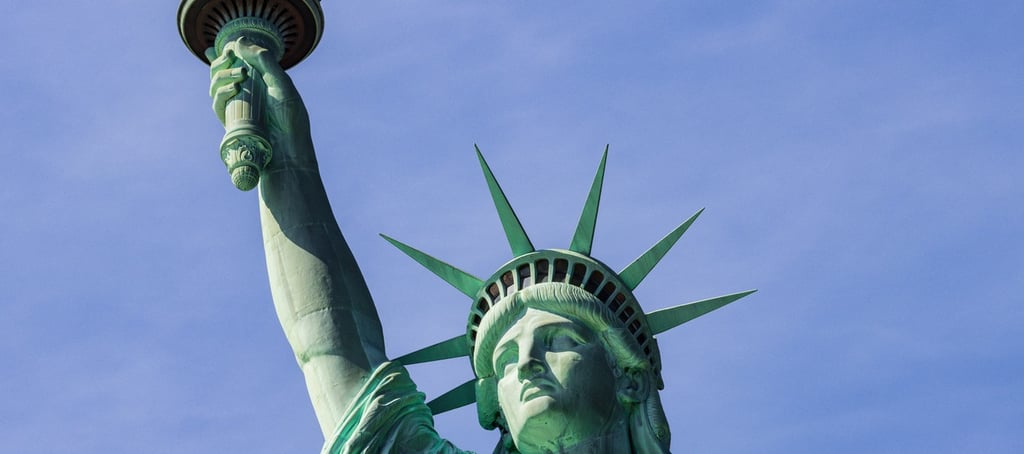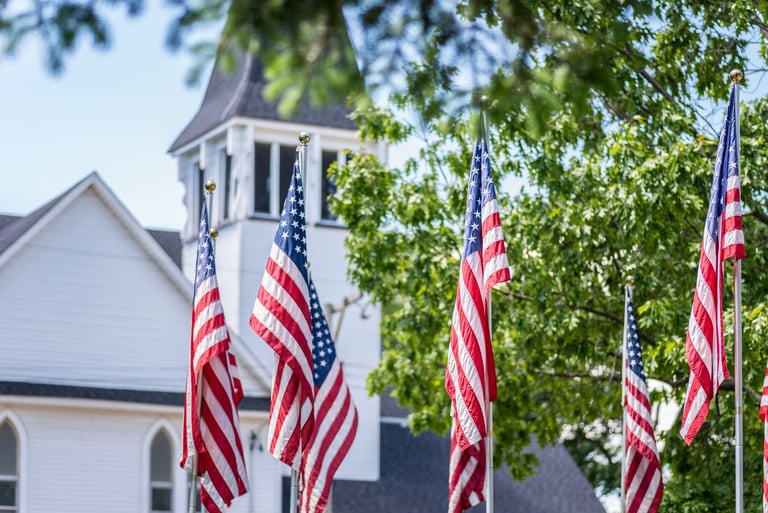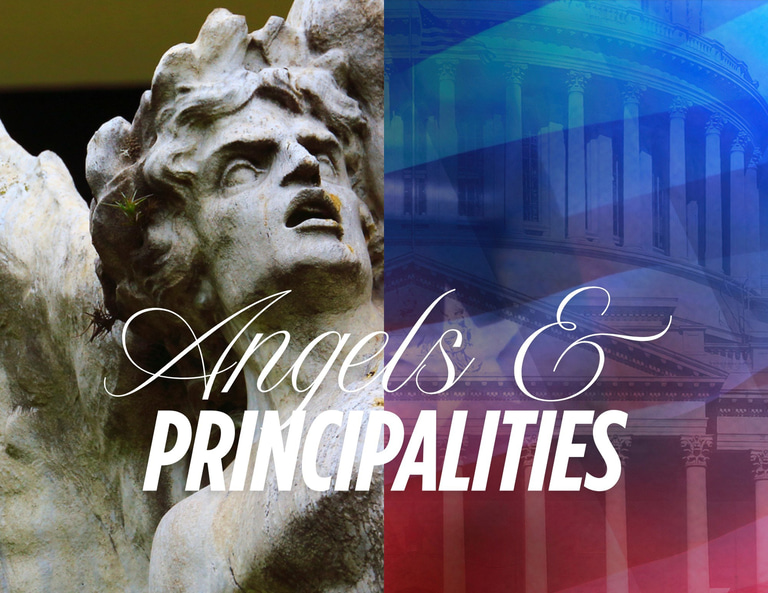Frank DuNN: Conversations at the junction of faith and politics
Is Patriotism For Scoundrels?
"Patriotism is the last refuge of the scoundrel," wrote Samuel Johnson, an Englishman who lived during the period of colonial rebellion in America. Patriotism has sometimes been the flag flown by those dedicated to loving the country as they idealize it. But patriotism may live in the hearts of those who want to change their nation in accordance with its bedrock principles..
Frank Dunn
5/5/20259 min read


In 1967, when the Viet Nam War was getting daily more frightening, I landed in Princeton, New Jersey. Going to Princeton Theological Seminary was my choice alternative to going into the army. By the time I made that decision, I was opposed to the war, but that was not my main concern. My biggest fear was going through the arduous physical training that I knew awaited any army recruit. I knew I didn’t like anything about rigorous physical exercise—Boy Scouts and college physical education had taught me that much—and I knew that there was no way around that should I be drafted.
Oddly, today I think I’d do pretty well, even at my age, going through much of the standard physical training. But what I am today is nothing like what I was at 22.
One evening, the local Indian community held a cultural celebration in the seminary auditorium. A handful of friends and I attended out of interest in Asian things. At the end of the evening, the audience stood and sang the Indian national anthem. The MC turned to us, obviously American guests seated on the front row, and invited us to sing the United States national anthem. It was a gesture of hospitality and respect. A sour clot of rebellion rose in my throat. Neither I nor any of my friends stood in response. Silent we sat. Someone in the group shook his head. The rest of us followed suit. The MC repeated his invitation. Still, we didn’t rise.
I suspect the MC thought we were just shy boys who were loath to sing publicly. There might have been some shyness among others of us, but I would not have minded singing in front of an auditorium full of people. No, we were adamantly opposed to any show of “patriotism” because at that point none of us felt particularly patriotic. Many of our friends were already being killed in jungles on the other side of the world in a war that we’d begun to believe was wrong. “Patriotism” had been co-opted by Americans who believed that not fighting in a war promoted by the US government was emphatically unpatriotic. Perhaps they were right. But that to us didn’t make patriotism right. Certainly not if patriotism meant throwing bodies into a politically generated meatgrinder.
Often misunderstood, Samuel Johnson spoke his mind in 18th century Britain when, disgusted with “patriotism” as a reason for politics he disagreed with, he wrote, “Patriotism is the last refuge of the scoundrel.” There have been times when I have agreed with Dr. Johnson’s sentiment. One of them was that night on the Princeton Seminary campus when I refused to be “patriotic.”
The ensuing years saw divisiveness engulf American society. Flags burned. National Guard units were called out to quell protests. Politicians bickered. Families splintered. Things having nothing to do with the war became inflammatory. Long hair on men and boys was seen as an act of defiance advertising disrespect for custom and convention. People leapt to conclusions that “hippies” were anti-American. Then, in 1968, all exploded in the assassinations of Dr. Martin Luther King and Robert F. Kennedy. Those of John Kennedy and Malcolm X were in the recent enough past that a sense of decomposition in American society was palpable.
The phrase “Black Power” grew out of the rage of people in the ghettos of cities like Newark and Detroit and dozens more. It frightened white people, especially those who were invested in the systems that had brought them increasing prosperity. Added to that, the self-critiques going on in institutions such as churches further fragmented much of American society.
Patriotism was becoming practically synonymous with being reactionary.
I worked in a black Baptist church in Montclair, New Jersey on weekends during my second year of seminary. Listening to black teens, lunching on Sundays with black families, having deep conversations with some church members, spending nights in the homes of black people, this Southern white boy got to experience what it felt like to be a minority. I was the minority. The difference between my experience and that of the folks in Union Baptist Church was that I was welcomed, affirmed, honored, and, I believed, loved. Many of them would not have been had they appeared in my home church. I was also tested and on at least one occasioned, confronted aggressively by some young people who in effect told me to keep my mouth shut because a white guy had nothing whatsoever to tell black people.
The Democratic convention that year was a disaster. I voted for Humphrey. Nixon won the Presidency. For the next four years, we continued to endure the acidity of the political climate. By the time 1972 rolled around, I was ordained, living in a very different environment in Charlotte, North Carolina. That was a hard year too. And, of course, in the middle of election season was the Watergate break-in. What followed was a national nightmare.
The backdrop of it all was Viet Nam. The war raged on, dragged on, and people grew angrier. Busing students to achieve racial balance in schools polarized cities, of which Boston was one and Charlotte was another big divider. Nearly a decade after the Civil Rights movement was coming to a head, it seemed as if little ground had been gained.
It felt as if the old patriotic symbols and songs that stirred generations of Americans were now ironic reminders of how far we were from the ideals that purportedly guided the nation.
Watergate became the fixation of a generation that still got its news from media and not from social media. Televised hearings revealed the machinations of the Nixon administration, on top of the exposés of investigative reporters. Finally, even the Republicans in Congress had had it with Nixon. He was impeached and having been told by Senators of his party that there were enough votes to convict him, he resigned. His Vice-President Gerald Ford succeeded him. Not long after taking the Oath of Office, Ford pardoned Nixon, another divisive move.
On the Fourth of July 1976 my wife and I with our 3½-year-old daughter went to a parking lot in downtown Charlotte to celebrate the Bicentennial by watching a fantastic fireworks display. One of the local radio stations broadcast a medley of patriotic music coordinated with the light show. All the favorites were on the playlist. I watched. I listened. I wept.
Tears of grief, tears of joy, a flood of emotions triggered by the rockets’ red glare and the images of purple mountain majesties and gleaming alabaster cities stirred some old patriotic sediments in my soul that had hardened over the previous decade.
Now, nearly half a century later, I’ve been on the eternal see-saw of political fashion. Some events have had lasting impact. All have been a continuous fight over what the country is and what it will become. The same thing could have been said, and indeed was said, during the first half of the 19th century when the nation was still young. Not a century had gone by before Lincoln declared at Gettysburg that the Civil War was testing whether a nation conceived and dedicated to the proposition that all [men] are created equal could long endure. Reconstruction hardly got off the ground before those who had rebelled and their supporters effectively throttled the emancipation that the Civil War had ostensibly achieved.
And here we are, more than a century and a quarter after the Gilded Age of the Robber Barons, and the President of the United States, himself a felon convicted for fraudulent business practices, takes as his model William McKinley who was President during the age when the wealthiest Americans became wealthier while child labor, unsafe work environments, contaminated water and disease were rampant in cities and rural people had no social safety net when times were hard, as they often were. Not until Theodore Roosevelt succeeded to the Presidency and began to offer the people a “Square Deal” by implementing reforms ushering in the short-lived “Progressive Era” did the lives of ordinary people begin to improve. Not until the roaring 1920’s crashed in 1929 with the collapse of the stock market did bleakness and despair set in so hard, so cruelly, that people could stand it no more and elected Franklin Roosevelt. They got what he promised: a New Deal.
Some have never gotten over that even after nearly a century. The rich, Roosevelt said, hated him. They still detest his legacy.
What now is there to be patriotic about? How can we sing the praises of a country flawed by so many ills, such a plethora of broken promises, so high a pile of unmet challenges? It is that the idea of America is still worth burnishing. The breath that is left in the land of the free is enough to sing “America, America! God shed his grace on thee.” The grit that kept soldiers fighting during the D-Day invasion and on Iwo Jima and Okinawa is not just for those who bore arms, but for those who are now willing to stand along roadsides or pound pavements with signs and placards saying “Due Process Is For ALL” and “No Kings!” and “Hands Off Our Constitution!” The opening phrase of the Constitution turns out to be on the lips of ordinary Americans who are determined not to see the whole experiment trashed: “We the People” is more than those in charge. In fact, it is more basic than those in charge.
I’m willing to spend time talking, writing, demonstrating, protesting, doing whatever I can to make “We the People” more than a phrase destined for tomorrow’s garbage and future documentaries of the Republic That Was.
If Christian faith has taught me anything, it is that while all things created come from dust and return to dust, still there are those things that are a part of the constancy of the Universe. My faith leads me to embrace mortality as a given. All things die, but not all Truth. Not Love. Not all Justice. One cataclysmic event can eliminate life on the entire planet, as practically happened when an asteroid collided with Earth starting a conflagration that wiped out the dominant animal species we know as dinosaurs and most plant life as well. The resulting wasteland lasted for eons until life gradually peeped out from the ash heap. All those purple mountain majesties and fruited plains and shining seas we sing about were slow to come about.
My life is less than a flicker in daylight bathing tomorrow morning. In geologic time, I count for nothing. Neither does Old Glory or the White House or the Statue of Liberty or anything else on earth.
Yet, in the course of human events—to coin a phrase—there come moments when humanity leaps forward into a new level of consciousness. Often it is prompted by the meanest of motives, mixed with all the dregs of failed human efforts, rife with the stench of the old Enemy whose delight is Death and Destruction, whose armor is Power and Control. Still the leap forward brings about something monumental in the annals of Earth and Earth’s humanity. Such a moment was when a quill pen moved across a piece of parchment in 1776 writing “When in the course of human events...” Such an instance was when a printer set in type the document that began “We the People of the United States, in order to form a more perfect union...”
I’m willing to spend some energy being patriotic even in a country deeply flawed and its birthright on life-support. Not because patriotism is necessarily beautiful or good or unalloyed, but because the Patria inspiring the patriot is one of those ideas I’m convinced come out of the loving heart that brought creation into being and whose body all creation is.
Bill Calkins Responds
I appreciated the opportunity to read the column you wrote on patriotism. I am unable to find a place to respond directly to the post, so I thought I’d just send it to you directly. One of the most offensive forms of Idolatry I’ve ever encountered is the blurring of patriotism with worship of God. I find no idol more false than an American flag on the altar next to a cross or other sacred symbol. To equate love of country with devotion to God is the same as worshiping a false god. I am deeply offended when the selected hymns in the first part of July are patriotic songs, including the national anthem. A good counter to this is the song I first encountered in the United Methodist hymnal and sung on the Fourth of July:
THIS IS MY SONG * (tune of Finlandia)
This is my song,
O God of all the nations,
A song of peace for lands afar
and mine.
This is my home, the country
where my heart is;
Here are my hopes, my dreams,
my holy shrine;
But other hearts in other lands
are beating
With hopes and dreams as true
and high as mine.
My country's skies are bluer than
the ocean,
And sunlight beams on clover-
leaf and pine.
But other lands have sunlight too
and clover,
And skies are everywhere as
blue as mine.
Oh, hear my song, O God of all
the nations,
A song of peace for their land
and for mine.


